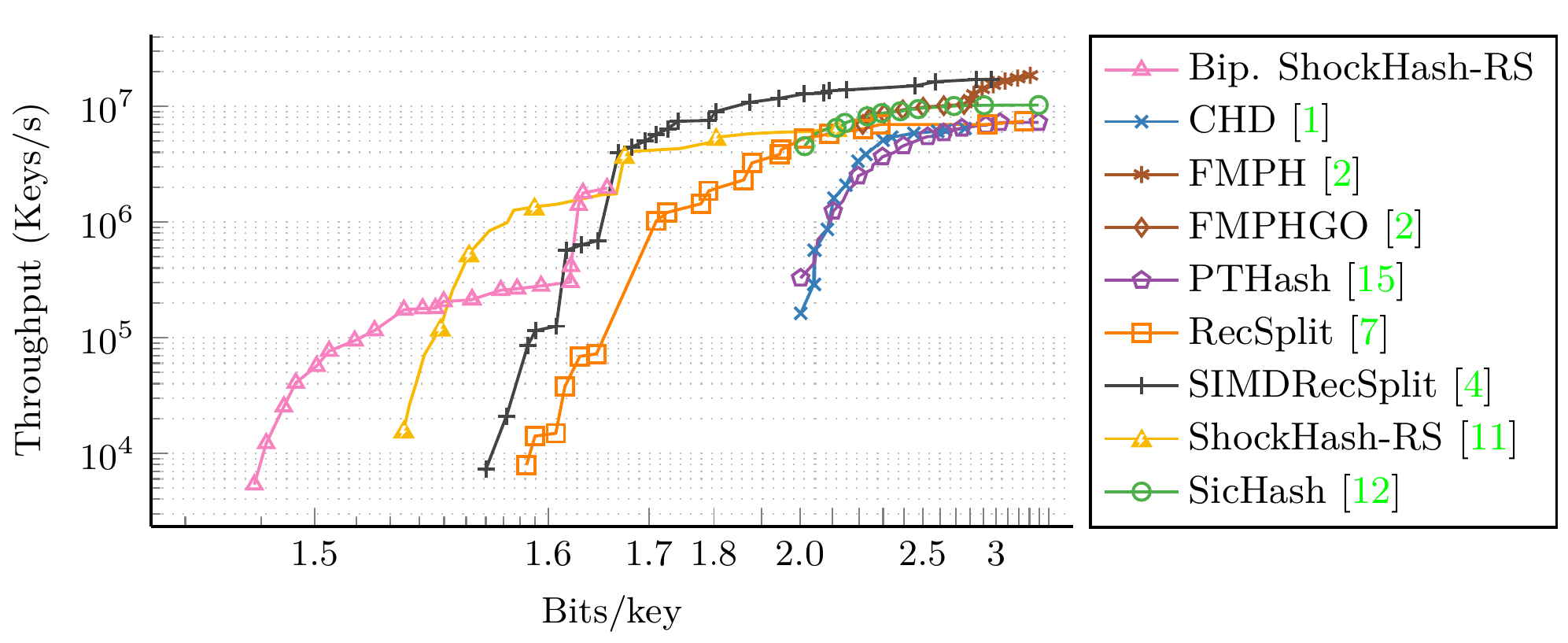Ecosyste.ms: Awesome
An open API service indexing awesome lists of open source software.
https://github.com/bytehamster/shockhash
Towards Optimal-Space Minimal Perfect Hashing Beyond Brute-Force
https://github.com/bytehamster/shockhash
Last synced: about 2 months ago
JSON representation
Towards Optimal-Space Minimal Perfect Hashing Beyond Brute-Force
- Host: GitHub
- URL: https://github.com/bytehamster/shockhash
- Owner: ByteHamster
- License: gpl-3.0
- Created: 2023-08-18T13:19:23.000Z (over 1 year ago)
- Default Branch: main
- Last Pushed: 2024-10-01T14:57:31.000Z (3 months ago)
- Last Synced: 2024-10-31T21:42:17.252Z (about 2 months ago)
- Language: C++
- Size: 1.16 MB
- Stars: 10
- Watchers: 4
- Forks: 1
- Open Issues: 0
-
Metadata Files:
- Readme: README.md
- License: COPYING
Awesome Lists containing this project
README
# ShockHash
[](https://www.gnu.org/licenses/gpl-3.0)

A minimal perfect hash function (MPHF) maps a set S of n keys to the first n integers without collisions.
Perfect hash functions have applications in databases, bioinformatics, and as a building block of various space-efficient data structures.
ShockHash (**s**mall, **h**eavily **o**verloaded **c**uc**k**oo **hash** tables) is an MPHF that achieves space very close to the lower bound,
while still being fast to construct.
In contrast to the simple brute-force approach that needs to try e^n = 2.72^n different hash function seeds,
ShockHash significantly reduces the search space.
Instead of sampling hash functions hoping for them to be minimal perfect, it samples random graphs,
hoping for them to be a pseudoforest.
In its most space-efficient variant, it can reduce the running time to just 1.16^n,
while still being asymptotically space optimal.
Still being an exponential time algorithm, we integrate ShockHash into several partitioning frameworks.
Our implementation inside the [RecSplit](https://github.com/vigna/sux/blob/master/sux/function/RecSplit.hpp) framework achieves the best space efficiency.
Using ShockHash inside our novel k-perfect hash function achieves fast queries
while still being faster to construct and more space efficient than any previous approaches.
### Library Usage
Clone (with submodules) this repo and add it to your `CMakeLists.txt`:
```cmake
add_subdirectory(path/to/ShockHash)
target_link_libraries(YourTarget PRIVATE ShockHash)
```
Then use one of the following classes:
- [ShockHash](https://github.com/ByteHamster/ShockHash/blob/main/include/ShockHash.h) is the original ShockHash algorithm integrated into the RecSplit framework.
- [SIMDShockHash](https://github.com/ByteHamster/ShockHash/blob/main/include/SIMDShockHash.hpp) is the SIMD-parallel version of the original ShockHash algorithm. Both ShockHash and the RecSplit framework are SIMD-parallelized. If this implementation is used on a machine without SIMD support, it is slower than the non-SIMD version because SIMD operations are emulated.
- [ShockHash2](https://github.com/ByteHamster/ShockHash/blob/main/include/ShockHash2.h) is the bipartite ShockHash algorithm. Only the inner ShockHash loop is SIMD-parallel, the RecSplit framework is not. If this implementation is used on a machine without SIMD support, the implementation uses sequential operations without explicitly emulating SIMD. To turn off SIMD, change to SIMD lanes of size 1 in [ShockHash2-internal.h](https://github.com/ByteHamster/ShockHash/blob/main/include/ShockHash2-internal.h).
Constructing a ShockHash perfect hash function is then straightforward:
```cpp
std::vector keys = {"abc", "def", "123", "456"};
shockhash::ShockHash<30, false> shockHash(keys, 2000); // ShockHash base case size n=30, bucket size b=2000
std::cout << shockHash("abc") << " " << shockHash("def") << " "
<< shockHash("123") << " " << shockHash("456") << std::endl;
// Output: 1 3 2 0
```
We also give the base-case implementations without the RecSplit framework, which makes it easier to understand the main idea.
- Original [ShockHash](https://github.com/ByteHamster/ShockHash/blob/main/benchmark/bijections/ShockHash1.h).
- [Bipartite ShockHash](https://github.com/ByteHamster/ShockHash/blob/main/include/ShockHash2-internal.h). The outer loop that is also given in the pseudocode of the paper is given in `BijectionsShockHash2::findSeed`.
### Construction performance
[](https://arxiv.org/abs/2310.14959)
### Licensing
ShockHash is licensed exactly like `libstdc++` (GPLv3 + GCC Runtime Library Exception), which essentially means you can use it everywhere, exactly like `libstdc++`.
You can find details in the [COPYING](/COPYING) and [COPYING.RUNTIME](/COPYING.RUNTIME) files.
If you use [ShockHash](https://arxiv.org/abs/2308.09561) or [bipartite ShockHash](https://arxiv.org/abs/2310.14959) in an academic context or publication, please cite our papers:
```
@misc{lehmann2023shockhash,
title={ShockHash: Towards Optimal-Space Minimal Perfect Hashing Beyond Brute-Force},
author={Hans-Peter Lehmann and Peter Sanders and Stefan Walzer},
year={2023},
eprint={2308.09561},
archivePrefix={arXiv},
primaryClass={cs.DS}
}
@misc{lehmann2023bipartite,
title={Bipartite ShockHash: Pruning ShockHash Search for Efficient Perfect Hashing},
author={Hans-Peter Lehmann and Peter Sanders and Stefan Walzer},
year={2023},
eprint={2310.14959},
archivePrefix={arXiv},
primaryClass={cs.DS}
}
```